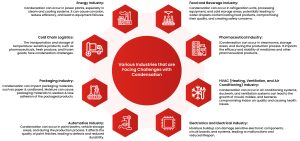What is Condensation?
Condensation is a common phenomenon that occurs when warm, moist air comes into contact with a cooler surface. This transition causes water vapour to condense into liquid droplets, leading to the formation of moisture. While condensation may seem harmless, it can have detrimental effects on various industries and environments. Let’s find the causes of condensation, and its implications, and explore effective prevention methods developed by Bry-Air to mitigate its impact.
What Causes Condensation?
Condensation occurs when the air reaches its dew point, which is the temperature at which it can no longer hold all the moisture it contains. Some common factors that contribute to condensation are:
a) Temperature Difference: When warm, humid air encounters a cooler surface, such as walls, windows, or pipes, the temperature difference causes condensation to form.
b) High Humidity: Increased moisture content in the air raises the chances of condensation.
The Implications of Condensation
Condensation can lead to a range of problems, including:
a) Structural Damage: Prolonged exposure to moisture can cause deterioration of building materials, such as wood rot, corrosion of metal surfaces, and the growth of mould and mildew.
b) Equipment Malfunction: Condensation can adversely affect sensitive electronic equipment, machinery, and instruments, leading to malfunctions, corrosion, and reduced efficiency.
c) Product Contamination: Industries that require controlled environments, such as pharmaceuticals, food processing, and electronics, can suffer from product spoilage and contamination due to condensation.
Various Industries that are Facing Challenges with Condensation

Know How Bry-Air Advanced Moisture Removal Technology Prevents Condensation
Bry-Air dehumidifiers utilize advanced moisture removal technology to maintain the desired humidity levels. Bry-Air’s desiccant-based dehumidifiers utilize moisture-absorbing materials, such as silica gel or molecular sieves, to extract moisture from the air. These materials have a high affinity for water vapour, allowing them to efficiently adsorb moisture and prevent condensation. Desiccant dehumidifiers are particularly effective in low-temperature environments and applications where very low humidity levels are required.
Additional Features and Benefits
Aside from their core moisture removal mechanisms, Bry-Air dehumidifiers come equipped with additional features and benefits that enhance their condensation prevention capabilities:
Precise Humidity Control: Bry-Air dehumidifiers offer precise humidity control, allowing users to set and maintain the desired humidity levels. This feature ensures optimal conditions to prevent condensation effectively.
Energy Efficiency: Bry-Air emphasizes energy-efficient designs in their dehumidifiers. By utilizing advanced technologies and intelligent control systems, these units maximize performance while minimizing energy consumption, contributing to sustainable and cost-effective operations.
Choose Bry-Air for Condensation and Prevention
Bry-Air dehumidifiers offer reliable solutions for preventing condensation in various industrial, commercial, and residential settings. Through their refrigeration, desiccant, and hybrid technologies, these dehumidifiers effectively remove excess moisture from the air, maintaining optimal humidity levels and preventing condensation-related problems. With additional features like precise humidity control, air filtration, and energy efficiency, Bry-Air dehumidifiers provide comprehensive solutions to create dry rooms.




